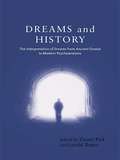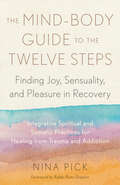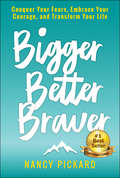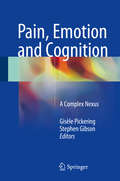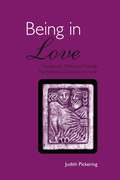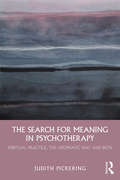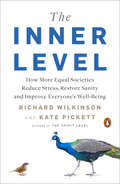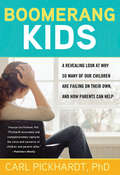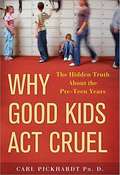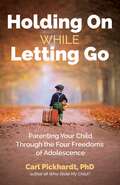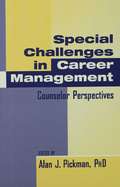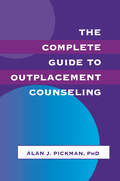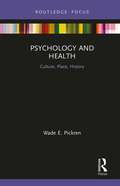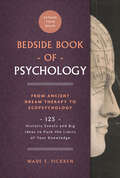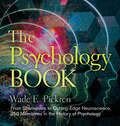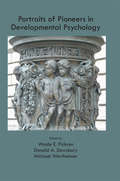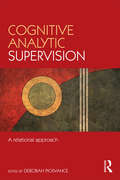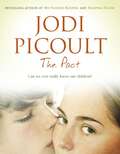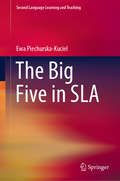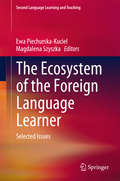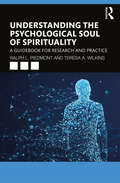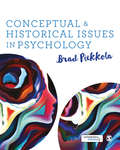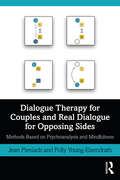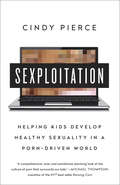- Table View
- List View
Dreams and History: The Interpretation of Dreams from Ancient Greece to Modern Psychoanalysis
by Daniel Pick Lyndal RoperWhat is a dream?Dreams are universal, but their perceived significance and conceptual framework change over time. This book provides new perspectives on the history of dreams and dream interpretation in western culture and thought. Dreams and History contains important new scholarship on Freud's Interpretation of Dreams (1900) and subsequent psychoanalytical approaches from distinguished historians, psychoanalysts, historians of science and anthropologists. This collection celebrates and evaluates Freud's landmark intellectual production, whilst placing it in historical context. A modern view of psychoanalysis, it also discusses the controversial idea of the role of the external world on the shaping of unconscious mental contents.In highly accessible language it proceeds through a series of richly illustrated case studies, providing new source materials and debates about the causes, meanings and consequences of dreams, past and present: from Victorian anthropological exploration of ancient Greek dream sources to peasant interpretation of dream-life in communist Russia; from concepts of the dream in sixteenth-century England to visual images in nineteenth-century symbolist painting in France. Dreams and History will fascinate those interested not only in psychoanalysis and history, but also arts, culture, humanities and literature.
The Mind-Body Guide to the Twelve Steps: Finding Joy, Sensuality, and Pleasure in Recovery--Integrative spiritual and somatic practices for healing from trauma and addiction
by Nina PickA trauma-sensitive companion to the Twelve Steps: body-based exercises for deepening your recovery, expanding your spiritual practice, preventing relapse, and understanding the root of your addiction. For readers of In the Realm of Hungry Ghosts and Trauma and the 12 StepsConsidering addiction through a trauma-informed lens, The Mind-Body Guide to the Twelve Steps offers an accessible, lyrical, and practical guide to Twelve Step recovery that emphasizes self-compassion, relationship, embodied awareness, and ecological connection.Whether you're suffering from an active addiction, seeking freedom from self-limiting behaviors, or hoping to establish or grow your spiritual practice, this innovative guide offers a holistic roadmap to navigating the journey of recovery.Somatic and spiritual counselor, educator, and writer Nina Pick shows how addiction is rooted in survival strategies that protect us from overwhelmingly painful experiences.Pick draws on attachment theory, polyvagal theory, somatics, mindfulness, trauma therapy, Jewish and integrative spirituality, and her own long-time experience in recovery to expand the Twelve Step practice beyond the conventional cognitive approach into one of &“soul recovery&”—a profound and sensuously embodied spiritual path.With reflections and practices designed to complement the literature and tools offered by your specific Twelve Step program, The Mind-Body Guide to the Twelve Steps shows you how to:Explore powerlessness and unmanageabilityIntegrate dance, vocalization, and other creative arts to enhance your recoveryCreate transformative ritual and ancestral healing practicesExpand your ideas of Higher Power and prayerForgive yourself and others Cultivate daily practices for reflection and meditationUnderstand the intersections of addiction, developmental trauma, and intergenerational traumaDrawing on plant medicine, mindfulness, poetry, self-directed touch, ritual, and guided imagery, The Mind-Body Guide to the Twelve Steps nurtures a joyful and heart-centered path to recovery and complements the healing work of Peter Levine, Bessel van der Kolk, and Arielle Schwartz.
Bigger Better Braver: Conquer Your Fears, Embrace Your Courage, and Transform Your Life
by Nancy Pickard"Nancy Pickard shows us how to override our fears, bust through our excuses, and go for our dreams. Filled with relatable stories, tried-and-true teachings, tools, tips, as well as useful exercises and meditations, this book supports you in stepping out of your old definition of self and re-thinking your next chapter." - Kelley Kosow, author of The Integrity AdvantageIn Bigger, Better, Braver, master integrative life coach Nancy Pickard challenges us with life-altering questions: Is there something you’d love to do but haven’t found the courage?Do you want to give yourself over to the fullest possible experience of living? Do you want to take a leap toward a bigger, better, braver life? Bigger Better Braver is a proven, step-by-step guide for executing the vision you have to live the life you are meant to lead. Enhanced with inspirational client and personal stories, it shows you how to get unstuck from old behaviors and take bold steps toward something new and larger in your life.The book is a journey, as Nancy lays out time-tested tools to face and overcome, get free of your comfort zone, cultivate fear as a force for change, and discover courage to take bold steps in the future. She teaches how to be more present, use your intuition, and stop living on autopilot. Chapters include: •Uncover Your Vision•Planning Your Leap•Understand Faith and Fear•Staying the Course, and more. Ms. Pickard proves her methods work. She reinvented herself as a master life coach, and climbed Mount Kilimanjaro at 61- experiences that became her vision for your bigger life. Not everyone must climb a mountain to live larger. Your bigger life can be anything that brings elation, accomplishment, fulfillment, and connection with the spirit of who you are. Bigger Better Braver provides the pathway to uncover your personal vision and opens the door for a major life change."Nancy’s step-by-step approach to change provides the puzzle pieces that create the inner foundation for successful outer change that is Bigger, Better and Braver. May you use this process to create the better story that your life is asking, and may that new story equip you to serve the world in the way that only you can." - Gail Larsen, author of Transformational Speaking
Pain, Emotion and Cognition
by Gisèle Pickering Stephen GibsonThis book focuses on the reciprocal interactions between pain, emotion and cognition. International experts report on their findings, clinical experience and the most recent literature on the complex relations between these three domains. Clinical, psychological, behavioral and neuroimaging approaches converge towards aiding patients suffering from pain, cognitive impairment or emotional distress. Beyond the pathophysiological aspects of pain, difficulties encountered with patients are analyzed and strategies are proposed to optimize treatment, doctor-patient relationships, and patient well-being. This work will appeal to a broad readership, from clinical medical practitioners to psychologists, nurses and pain specialists.
Being in Love: Therapeutic Pathways Through Psychological Obstacles to Love
by Judith PickeringFinding true love is a journey of transformation obstructed by numerous psychological obstacles. Being in Love expands the traditional field of psychoanalytic couple therapy, and explores therapeutic methods of working through the obstacles leading to true love. Becoming who we are is an inherently relational journey: we uncover our truest nature and become most authentically real through the difficult and fearful, yet transformative intersubjective crucibles of our intimate relationships. In this book, Judith Pickering draws comparisons between Bion's concept of becoming in O, and being in love. She searches for pathways that lead away from relational confusion towards the discovery of genuine transformational relationships, and works towards finding better ways of relating to one another. This is achieved by encouraging couples to enjoy the actual presence, humanity, otherness and particularity of each other rather than expecting a partner to conform to our own expectations, projections, desires and presuppositions. Pickering draws on clinical material, contemporary psychoanalysis, cultural themes from the worlds of mythology and literature, and a wealth of therapeutic techniques in this fresh approach to couple therapy. Being in Love will therefore interest students and practitioners of psychoanalysis, psychology, and couple therapy, as well as all of those seeking to be more authentic in their relationships.
The Search for Meaning in Psychotherapy: Spiritual Practice, the Apophatic Way and Bion
by Judith Pickering2020 American Board & Academy of Psychoanalysis (ABAPsa) book award winner! If, when a patient enters therapy, there is an underlying yearning to discover a deeper sense of meaning or purpose, how might a therapist rise to such a challenge? As both Carl Jung and Wilfred Bion observed, the patient may be seeking something that has a spiritual as well as psychotherapeutic dimension. Presented in two parts, The Search for Meaning in Psychotherapy is a profound inquiry into the contemplative, mystical and apophatic dimensions of psychoanalysis. What are some of the qualities that may inspire processes of growth, healing and transformation in a patient? Part One, The Listening Cure: Psychotherapy as Spiritual Practice, considers the confluence between psychotherapy, spirituality, mysticism, meditation and contemplation. The book explores qualities such as presence, awareness, attention, mindfulness, calm abiding, reverie, patience, compassion, insight and wisdom, as well as showing how they may be enhanced by meditative and spiritual practice. Part Two, A Ray of Divine Darkness: Psychotherapy and the Apophatic Way, explores the relevance of apophatic mysticism to psychoanalysis, particularly showing its inspiration through the work of Wilfred Bion. Paradoxically using language to unsay itself, the apophatic points towards absolute reality as ineffable and unnameable. So too, Bion observed, psychoanalysis requires the ability to dwell in mystery awaiting intimations of ultimate truth, O, which cannot be known, only realised. Pickering reflects on the works of key apophatic mystics including Dionysius, Meister Eckhart and St John of the Cross; Buddhist teachings on meditation; Śūnyatā and Dzogchen; and Lévinas’ ethics of alterity. The Search for Meaning in Psychotherapy will be of great interest to both trainees and accomplished practitioners in psychoanalysis, analytical psychology, psychotherapy and counselling, as well as scholars of religious studies, those in religious orders, spiritual directors, priests and meditation teachers.
The Inner Level: How More Equal Societies Reduce Stress, Restore Sanity and Improve Everyone's Well-Being
by Kate Pickett Richard WilkinsonA groundbreaking investigation of how inequality infects our minds and gets under our skinWhy are people more relaxed and at ease with each other in some countries than others? Why do we worry so much about what others think of us and often feel social life is a stressful performance? Why is mental illness three times as common in the USA as in Germany? Why is the American dream more of a reality in Denmark than the USA? What makes child well-being so much worse in some countries than others? As The Inner Level demonstrates, the answer to all these is inequality. In The Spirit Level Richard Wilkinson and Kate Pickett put inequality at the center of public debate by showing conclusively that less equal societies fare worse than more equal ones across everything from education to life expectancy. The Inner Level now explains how inequality affects us individually, altering how we think, feel and behave. It sets out the overwhelming evidence that material inequities have powerful psychological effects: when the gap between rich and poor increases, so does the tendency to define and value ourselves and others in terms of superiority and inferiority. A deep well of data and analysis is drawn upon to empirically show, for example, that low social status leads to elevated levels of stress hormones, and how rates of anxiety, depression and addictions are intimately related to the inequality which makes that status paramount. Wilkinson and Pickett describe how these responses to hierarchies evolved, and why the impacts of inequality on us are so severe. In doing so, they challenge the conception that humans are inescapably competitive and self-interested. They undermine, too, the idea that inequality is the product of "natural" differences in individual ability. This book draws together many of the most urgent problems facing societies today, but it is not just an index of our ills. It demonstrates that societies based on fundamental equalities, sharing and reciprocity generate much higher levels of well-being, and lays out the path towards them.
Boomerang Kids
by Carl PickhardtIn this breakthrough book, Carl Pickhardt exposes a hidden period of development that's causing college and post high school age kids to fail on their own. His new approach to understanding young adulthood proposes that, as a society, we expect 18- to 24-year-olds to have reached adulthood, when in reality they have reached the final stage of adolescence, called "trial independence. " Boomerang Kids shows parents how to understand this little-discussed period in their child's life and the helpful role they can play during this time to ensure their child's success.
Why Good Kids Act Cruel
by Carl PickhardtWhy do many good children treat one another so badly? This is a question parents eventually face and most start thinking about as their children prepare for high school. But the hard truth is, high school is too late. The pre-teen years are actually when it begins, when the cruelty is even worse, causing more anxiety and stress for children already facing an enormous amount of change in their lives. Early adolescence is a phase of anxiety, of uncertainty, of insecurity. To make matters worse, although all kids are going through the same transformation, none of them share what it is like, each feeling alone, isolated, and unique. The result is that even fantastic kids will do and say harmful things. Why Good Kids Act Cruel is the first book to give you an understanding of why cruelty happens during these years and how to help your child through these difficult times. She didn't make it; she was born with it: her nose. And in elementary school that was okay. But now in seventh grade, sometimes other girls would tease, "What's the matter Blaise, you having a bad nose day?" Looking in the mirror before school, she could see what they were making fun of. One day, a girl she had beaten out for a starting spot on the basketball team threw a nickname at her: "Snout. " Some of the girl's friends picked it up, and it stuck. Blaise acted like she didn't care. But as she started to hate her nose, she started to hate herself.
Holding On While Letting Go: Parenting Your Child Through the Four Freedoms of Adolescence
by Ph.D. Carl PickhardtHavard-trained psychologist and Psychology Today parenting expert Carl Pickhardt gives parents an eye-opening lifeline to what to expect on rocky road of middle school, revealing the Four Freedoms that every child must master to become a healthy adult--and how parents can adapt, encourage, and grow themselvesThis book explains to parents how four unfolding drives for freedom sequentially and cumulatively motivate adolescent growth, as this ten to twelve year coming of age passage forever changes the child, the parent in response, and the relationship between them. The four unfolding freedoms are these. First is freedom from rejection of childhood, around the late elementary school years, when the girl or boy wants to stop acting and being treated as just a child anymore. Second is freedom of association with peers, around the middle school years, when the girl or boy wants to form a second family of friends. Third is freedom for older experimentation, around the high school years, when the girl or boy wants to try more grown up activities. And fourth is freedom to claim emancipation, around the college age years, when the girl or boy decides to become their own ruling authority. With each successive push for freedom, parent and adolescent both have to do less holding on to each other while doing more letting go.
Special Challenges in Career Management: Counselor Perspectives
by Alan J. PickmanAs the practice of outplacement counseling continues to evolve, outplacement professionals are increasingly called upon to respond effectively to a rapidly changing set of counseling and business developments. One of the major trends is that the skills and expertise of outplacement practitioners are of value to individuals still employed within corporate organizations as well as to those who have already lost their jobs. Practitioners are designing programs and delivering services in the areas of executive coaching, organization development, internal career management, and more. Another trend is that career management professionals are challenged to provide effective services to an increasingly diverse group of candidates to ensure that they are maintaining the highest professional standards in their service delivery. And more attention is being given to innovative applications of technology to career management services. As a result of these evolving trends, the need has never been greater for career management professionals to think clearly about the services they deliver, to enhance their own professional development on an ongoing basis, and to respond effectively to changes in the labor market. One of the best ways to accomplish this growth is to fully tap the knowledge and experience of authorities in the field. The contributors to this volume are established industry leaders with demonstrated expertise in their areas of special interest. This volume is a valuable resource to all those interested in the fields of outplacement and career management-- especially current and "would-be" practitioners. Its contents will benefit candidates receiving career management services and human resources professionals whose organizations provide such services. It is also of interest to those from a variety of academic backgrounds including counseling psychology, organization development, and industrial/organizational psychology. For all of these audiences, this volume assembles practical, state-of-the-art information about important career development topics from a broad range of distinguished practitioners.
The Complete Guide To Outplacement Counseling
by Alan J. Pickman Alan J. Pickman, PhDRecognized by business managers as a useful and practical tool to assist them in responding to a set of complex business challenges, the need for outplacement counseling-- the process of assisting employees who have lost their jobs to develop effective career plans and to find new employment --has grown dramatically during the past two decades. Given this rapid expansion of the field, assembling, organizing, and clarifying the body of knowledge and information available about outplacement has become critically important. The first comprehensive effort in the field, this book presents authoritative, up-to-date information on an exhaustive range of outplacement topics. A psychologist and experienced outplacement practitioner, the author has recently been chosen as one of the charter fellows of the Outplacement Institute, the sole certifying organization for outplacement practitioners. Of value to all those interested in the field including current and future practitioners as well as human resources professionals, this volume contains essential information for candidates receiving outplacement services, counseling students, and researchers involved in the study of counseling in business and industry. With such a broad audience in mind, it contains a wide range of information--counseling theory and practical suggestions geared expressly to the needs of practitioners, descriptive material on all topics, and brief case histories of actual outplacement candidates. Written in non-technical language, the volume brings to life the flavor of outplacement practice. This unique volume covers topics not addressed elsewhere in the current outplacement literature including: *the psychological barriers to a successful job search, *the behavioral and counseling implications of the outplacement setting, *the theoretical basis of outplacement counseling, *the relation between outplacement and psychotherapy, *the professional development opportunities for outplacement practitioners, *the supervision of outplacement practitioners, *the cross-cultural issues to be considered in outplacement, *the relation of outplacement to other career development professionals, and *the marketing of outplacement services. Also of importance, the appendices offer data not previously disseminated to the general public including: *competencies standards for OPC practitioners as established by the International Association of Outplacement Professionals (IAOP), *standards of ethical practice for outplacement professionals as established by the IAOP, and *listings of information resources for OPC practitioners and candidates featuring a section on computer-based sources for conducting career-related research.
Psychology and Health: Culture, Place, History
by Wade PickrenWeaving together the various foundations of psychology and health into a compelling narrative, this book culturally and historically situates the practice, strengths, and shortcomings of the field. Historian of psychology Wade Pickren traces the development of the relationship of health and psychology through a critical history that incorporates context, culture, and place from the early modern period to the present day. Covering a range of topics and time periods including psychology and health in the nineteenth century; stress in post-World War II USA; and the relationship between body, mind, and emotion in the modern world, Psychology & Health: Culture, Place, and History outlines the journey of an understanding of health rooted in nature, to a commodity governed by the neoliberal values of the marketplace, including an exploration of the roles of self-help, emotions, and resilience. The book closes with an outline of contemporary alternatives in health psychology and points toward a future when, once again, psychology and health are grounded in nature. Throughout, the rich connections across cultures illustrate the importance of cultural variations in understanding health, disease, and treatment. This book is essential reading for scholars and students of health psychology at all levels. It will also be of interest to professionals and practitioners in related fields, as well as those interested in the enduring connection between health and psychology.
The Bedside Book of Psychology: 125 Historic Events and Big Ideas to Push the Limits of Your Knowledge (Bedside Bks. #2)
by Wade E. PickrenAn accessible, easy-to-follow illustrated guide to the 125 most important milestones in psychology. Now is the perfect time to expand your knowledge and learn something new or delve deeper into a topic you&’ve always been interested in. With 125 concise, informative, and entertaining entries, The Bedside Book of Psychology explores the key theories, discoveries, and experiments, influential personalities, and seminal publications in the field over the millennia. Wade Pickren covers a wide range of topics and cultures—from ancient philosophies of psychotherapeutic well-being such as shamanism, to mesmerism, multiple personality disorder, Freud&’s Interpretation of Dreams, Pavlov&’s conditioning experiments, mirror neurons, positive psychology, sexual fluidity, and climate-crisis psychology—all in an accessible, conversational voice. Includes seventy-five black-and-white illustrations throughout.
The Psychology Book: From Shamanism to Cutting-Edge Neuroscience, 250 Milestones in the History of Psychology (Union Square & Co. Milestones)
by Wade E. PickrenThis “profusely and beautifully illustrated” historical survey of psychology from prehistory to modern times is “ideal” and “highly recommended.” (Midwest Book Review)What could be more fascinating than the workings of the human mind? This stunningly illustrated survey in Sterlings Milestones series chronicles the history of psychology through 250 landmark events, theories, publications, experiments, and discoveries. Beginning with ancient philosophies of well-being, it touches on such controversial topics as phrenology, sexual taboos, electroshock therapy, multiple personality disorder, and the nature of evil.
Portraits of Pioneers in Developmental Psychology: Volume Vii
by Wade E. Pickren Donald A. Dewsbury Michael WertheimerUtilizing an informal, sometimes humorous style of writing, this book brings to life 16 developmental psychologists who made a significant contribution to their field. Written by noted scholars, each chapter provides a glimpse into the personal and scholarly lives of these innovative "pioneers". Some of the chapters are based on the contributor's personal acquaintance with a pioneer allowing for the introduction of previously unavailable information. Suggested Readings allow readers to delve deeper into the material and a tabular list of subjects and authors helps instructors supplement their courses in substantive areas of psychology with ease. The introductory essay prepares the reader for a deeper understanding of the contributions of each of the pioneers. Mamie Phipps Clark had a profound impact on the education of American children. Robert W. White pioneered a new approach to the study of persons across the lifespan. Lois Barclay Murphy’s perspective on the strengths of developing children foreshadowed later developments in positive psychology. Florence Goodenough pioneered new testing methods for children. John Paul Scott was a pioneer in the field of behavior genetics. The book also highlights the many contributions of European pioneers: Jean Piaget, Charlotte Bühler, Heinz Werner, and Lev Vygotsky. Their contributions were carried forward by J. McVicker Hunt in the U.S. and Helena Antipoff in Brazil. Arnold Gesell’s film studies of children’s development remain a landmark accomplishment. Lawrence Kohlberg pioneered the study of moral development across the lifespan. Roger Barker’s studies on aggression and leadership among children eventually led to the development of ecological psychology. Eleanor "Jackie" Gibson was famous for her work on the "visual cliff" and for her research on perception and development. Finally, Sidney Bijou had a long career delineating ways to improve the lives of children. Pickren’s concluding essay draws connections between the pioneers and how they contributed to the advancement of the field. Intended as a supplementary text for undergraduate and/or graduate courses in the history of psychology and/or developmental, child, or lifespan psychology taught in psychology, education, and human development, this engaging book also appeals to those interested in and/or teaching these subject areas. Each of the 7 volumes in the Portraits of Pioneers Series contain different profiles bringing more than 140 of psychology’s pioneers to life.
Cognitive Analytic Supervision: A relational approach
by Deborah PickvanceCognitive Analytic Supervision: A relational approach is the first book to present a cognitive analytic perspective on psychotherapy supervision. This edited collection of original chapters reflects the ways in which CAT therapists and supervisors have developed the model and used it in diverse settings. It is a significant contribution to the literature on relational psychotherapy supervision, written by established CAT supervisors, trainers and therapists who, together, have an enormous amount of professional and clinical experience. The book covers important areas such as: the relational theory and practice of CAT supervision a cognitive analytic conceptualization of narcissistic difficulties intercultural issues in supervision (based on CAT training experience in India) ethical and clinical dilemmas in supervision supervision of consultancy work Cognitive Analytic Supervision will be of interest to CAT supervisors, therapists and trainee supervisors, as well as supervisors and therapists working in other therapeutic models, in particular those with a relational approach. This book may be a useful bridge into relationally informed supervision for therapists who do not have an explicitly relational focus.
The Pact
by Jodi PicoultPerfect for fans of Gillian Flynn's Sharp Objects and Alice Sebold's The Lovely Bones, Number One bestselling author Jodi Picoult returns with the deeply moving THE PACT.When Chris wakes up in hospital, Emily is the first person he asks for. She is the love of his life. But Emily is dead, and Chris is the sole witness to what happened in the park that night.He claims it was a suicide pact: they were both meant to die.Then the investigation turns up motive for murder, and there is only one suspect . . .(P)2006 Hodder & Stoughton Audiobooks
The Big Five in SLA (Second Language Learning and Teaching)
by Ewa Piechurska-KucielThis book also focuses on analyzing each trait from the point of view of its higher and lower order structure, as well as from the affective, cognitive, behavioral, social and academic perspectives, apart from outlining the field of personality psychology. Personality traits are important in daily interaction, and are a significant factor in achieving educational goals also for second and foreign language (L2) learners. Consequently, studying the role of personality in the field of second language acquisition (SLA) appears to be of primary importance, especially because there has been little research on this subject. Moreover, general results pertaining to the role of personality in L2 are inconclusive. This book’s primary objective is to present a concise and updated picture of personality on the basis of the Big Five model, which is accessible for non-psychologists. The middle part of the book focuses on discussing potential merits and drawbacks of each trait for the purpose of the process of SLA, both from the formal and informal, theoretical and empirical points of view. The next part includes a description of an empirical study, whose main aim is to sensitize the reader to direct and indirect influences that personality may exert on L2 learning. The book closes with a concluding chapter aiming at clarifying directions for further empirical study of personality as well as issues in research methodology.
The Ecosystem of the Foreign Language Learner
by Ewa Piechurska-Kuciel Magdalena SzyszkaThis volume examines selected aspects of the foreign language learning process from an ecological perspective, adopting a holistic view on complex interrelations among and within organisms (L2 language learners) and their milieus (family, school and society). First of all, the personal ecosystem of the learner is taken into consideration, whereby two powerful influences are intertwined: cognitive and affective aspects. The learning space formed by the individual is largely shaped by their affective states coexisting in conjunction with their cognitive processes. Moreover, this specific space is also modified by a wider array of other personal ecosystems or those of cultures. Hence, the ecosystem of the foreign language learner is also subject to influences coming from sociocultural leverage that can be represented by people they know, like parents and language teachers, who can both directly and indirectly manipulate their ecosystem. At the same time other important forces, such as culture as a ubiquitous element in the foreign language learning process, also have the power to shape that ecosystem. Accordingly, the book is divided into three parts covering a range of topics related to these basic dimensions of foreign language acquisition (the cognitive, affective and socio-cultural). Part I, Affective Interconnections, focuses on the body of original empirical research into the affective domain of not only L2 language learners but also non-native language teachers. Part II, Cognitive Interconnections, reports on contributions on language learners' linguistic processing and cognitive representations of concepts. The closing part, Socio-cultural Interconnections, provides new insights into language learning processes as they are affected by social and cultural factors.
Understanding the Psychological Soul of Spirituality: A Guidebook for Research and Practice
by Ralph L. Piedmont Teresa A. WilkinsUnderstanding the Psychological Soul of Spirituality is a comprehensive exploration of spiritual constructs based on an empirical, evidence-based paradigm for understanding and addressing spirituality. In a field where there is no current consensus on spirituality, this book provides a much-needed psychologically based definition and ontology that assists helping professionals in formulating their professional identities; developing effective and appropriate training models; furthering their understanding of what spirituality is and is not, from a psychological perspective; and more effectively addressing spiritual issues to support clients. The authors provide a review of current issues in the area of spirituality, also called the numinous, and provide perspectives that address these concerns in ways that promote a fully scientific understanding of the construct. Ultimately the book provides a concise definition of the numinous that places it squarely in the social sciences. Chapters outline the clear value of the numinous for psychology and detail its relevance for professionals’ training.
Conceptual and Historical Issues in Psychology
by Mr Brad PiekkolaThis book covers key movements that helped to shape psychology – from the early philosophical debate between rationalism and empiricism or realists and antirealists through to the emergence of psychology as a science and the ongoing debates about ‘objectivity’ and ‘truth’ and what a science of psychology should be. Often nuanced and complex, the author examines major conceptual issues in the history of psychology that continue to be debated and influence public policy and lay understanding. The latter stages of the book explore notions of individuality, hereditarianism, critical psychology, and feminist perspectives. While deeply rooted in human history, it is made clear that psychology, how it is conceived and practiced, has a bearing on our understanding of what it is to be human. Accessible, objective and above all comprehensive, this book will help students locate psychology in the wider field of science and understand the forces that continue to shape and define it.
Conceptual and Historical Issues in Psychology
by Mr Brad PiekkolaThis book covers key movements that helped to shape psychology – from the early philosophical debate between rationalism and empiricism or realists and antirealists through to the emergence of psychology as a science and the ongoing debates about ‘objectivity’ and ‘truth’ and what a science of psychology should be. Often nuanced and complex, the author examines major conceptual issues in the history of psychology that continue to be debated and influence public policy and lay understanding. The latter stages of the book explore notions of individuality, hereditarianism, critical psychology, and feminist perspectives. While deeply rooted in human history, it is made clear that psychology, how it is conceived and practiced, has a bearing on our understanding of what it is to be human. Accessible, objective and above all comprehensive, this book will help students locate psychology in the wider field of science and understand the forces that continue to shape and define it.
Dialogue Therapy for Couples and Real Dialogue for Opposing Sides: Methods Based on Psychoanalysis and Mindfulness
by Jean Pieniadz Polly Young-EisendrathA clear, cogent, and comprehensive account of the rationale and methods of Dialogue Therapy and Real Dialogue, this volume introduces models of facilitated dialogue designed specifically to end polarization. This book offers a straightforward and comprehensive encounter with some of the most effective theories and methods to facilitate dialogue and disrupt deadening power struggles between life partners, grown children and parents, siblings, co-workers, and others whose conflicts have led to harmful polarizations. The book is based on ideas and relational models from mindfulness and psychoanalysis that have not been applied in this unique way before. This melding of mindfulness (containment, concentration, equanimity, maintaining a "mindful gap") with the psychoanalytic understanding of projection and projective identification (the "hijacking" of our subjective experiences) creates much more than light at the end of the tunnel. It engenders the acceptance of another that leads to love and insight, based on the recognition and acknowledgement of our autonomy and our common humanity in the midst of conflict. This book introduces a new, revolutionary model for couple therapists, life coaches, group facilitators, and leaders to open a mindful space that increases witnessing capacities in the midst of emotional conflict without imposing goals of agreement, reconciliation or compromise.
Sexploitation: Helping Kids Develop Healthy Sexuality in a Porn-Driven World
by Cindy PierceAs surprising as it may be to parents, young people today are immersed in porn culture everywhere they look. Through Internet porn, gaming, social media, and advertising, kids today have a much broader view of social and sexual possibilities, which makes it difficult for them to establish appropriate expectations or to feel adequate in their own sexuality. Parents tend to convince themselves that their children are immune to cultural influences, wait until it comes up, or hope schools and pediatricians will address the issues. Educators and doctors may be able to start the conversation but it is fundamentally a parent's job to provide information about sex and relationships early and often to help young people find their way through their social and sexual lives. Delaying the necessary but awkward conversations with their kids leaves them vulnerable. The media, marketers, and porn and gaming industries are eager to step in anywhere parents choose to hold back. Sexploitation exposes the truth to parents, kids, educators, and the medical profession about the seen and unseen influences affecting children, inspiring parents to take the role as the primary sexuality educator. With more information, parents will gain conviction to discuss and develop values, expectations, boundaries, and rules with their kids. Kids who enter their teens with accurate information and truths stand a better chance of developing an "inner compass" when it comes to sex and relationships, which sets them up for a healthy adulthood. In her comic and straightforward style, Pierce brings together the latest research with anecdotal stories shared with her by high school and college students in the thick of it. Above all else, her goal is to get people to develop more comfort around those difficult conversations so that kids gain more confidence and courage about drawing boundaries based on their own values not those put upon them.
